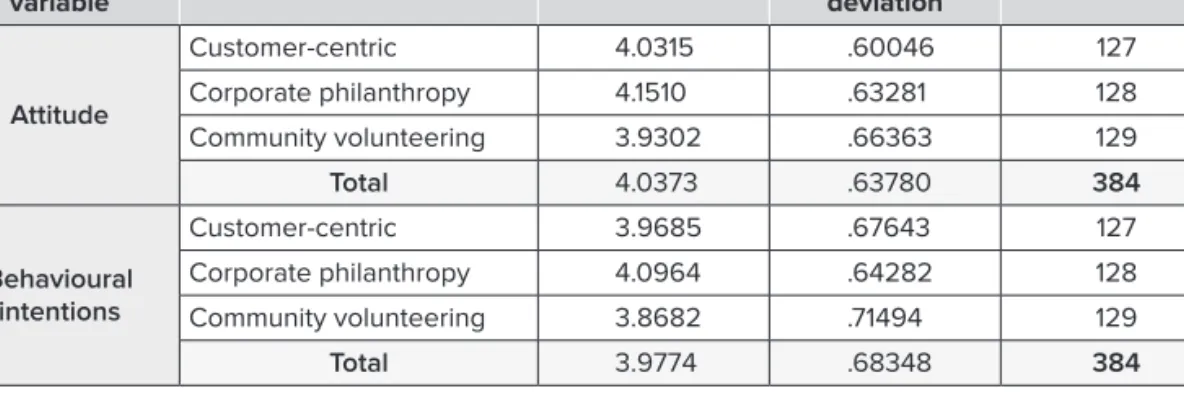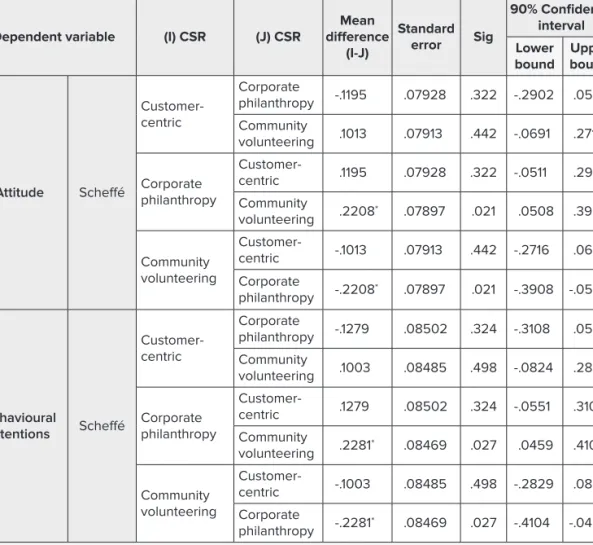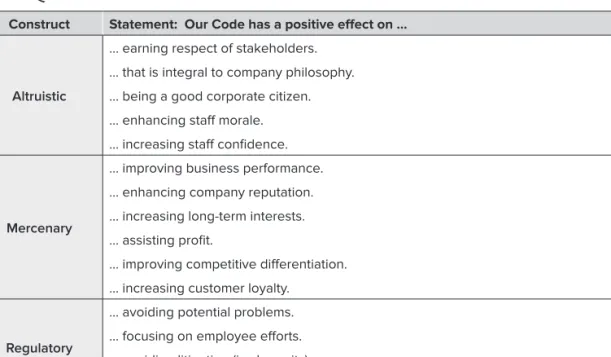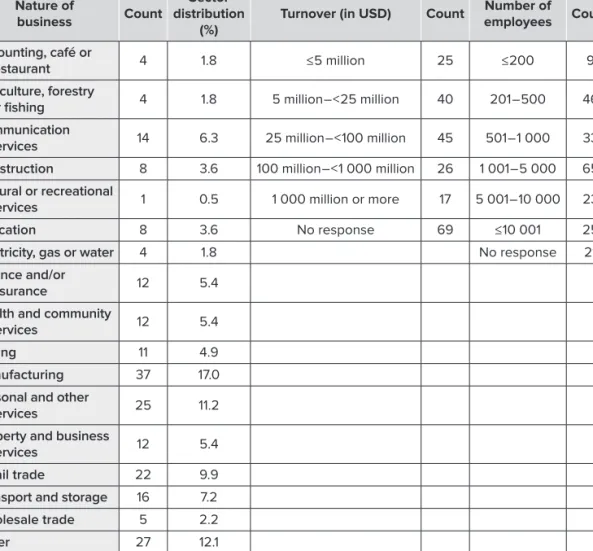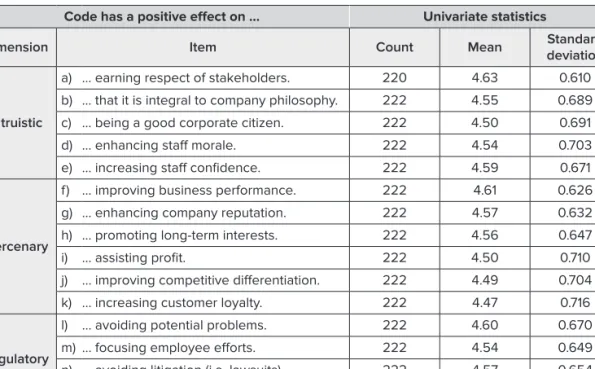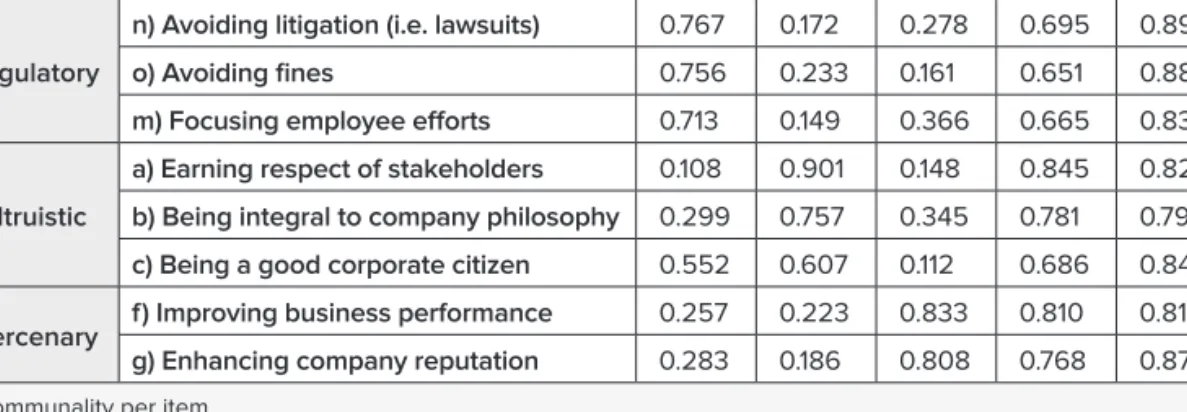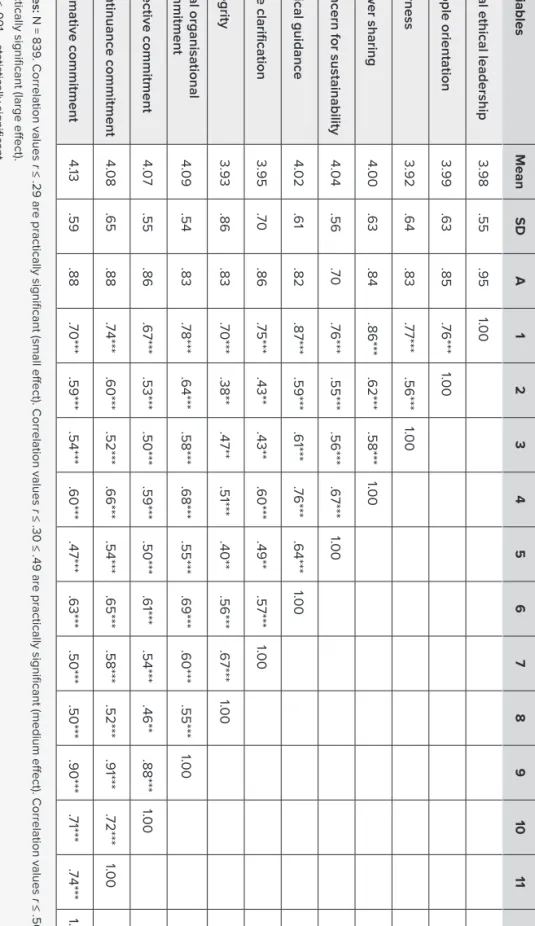Although customers may appreciate the psychological benefits associated with purchasing from firms whose CSR initiatives benefit causes they (i.e. the customers) care about (Bhattacharya et al., 2009), it has been argued that initiatives that provide direct benefits to customers , may be preferred over those that offer indirect psychological benefits (McDonald & Lai, 2011). For community volunteering, three components from Hinson (2012) were adapted: 'the bank regularly involves itself in cleaning exercises in communities'; 'the bank encourages its employees to donate part of their working hours to volunteer in classrooms'; 'the bank helps to plant trees in communities'. The fourth component of community volunteering. the bank organizes financial literacy clinics for its communities') was adapted from a website on prevailing Ghanaian bank CSR practices.
The initial evaluation of the modes of responses (attitude and behavioral intentions), led to the rejection of H1 which held that Ghanaian bank customers prefer customer-centric CSR initiatives over corporate philanthropy and community volunteering.

A construct of code effectiveness
The purpose of the study is to examine and describe the use of ethical codes in companies operating in South Africa. Therefore, ethics education is essential to ensure a stronger focus on offering ethics programs aligned with the company's business philosophy. This study therefore examines and describes the use of codes of ethics in 222 companies that have a code of ethics and operate within the borders of South Africa.
Three dimensions influenced by the company's code of ethics were tested, namely altruistic, mercenary and regulatory motives for action.
The population included company secretaries of the top 500 companies operating in the South African corporate sector. Kaptein agrees and states that the success of a code of ethics depends on the ability of all stakeholders in the company (ie the board of directors, management and employees) to understand its meaning and relevance to business practices. Mirzayev (2015) supports this statement and argues that “the level of corruption in emerging market economies is much higher than in developed countries”.
The King III report inspires companies to think about “the concept of integrated reporting in terms of how they are expected to report on their strategies, corporate governance, risk assessment, financial performance and sustainability dimensions, and to show how these components are connected. , to enable all relevant role players to holistically assess a company's performance in terms of the organization's ability to create and sustain value” (Makiwane & Padia.
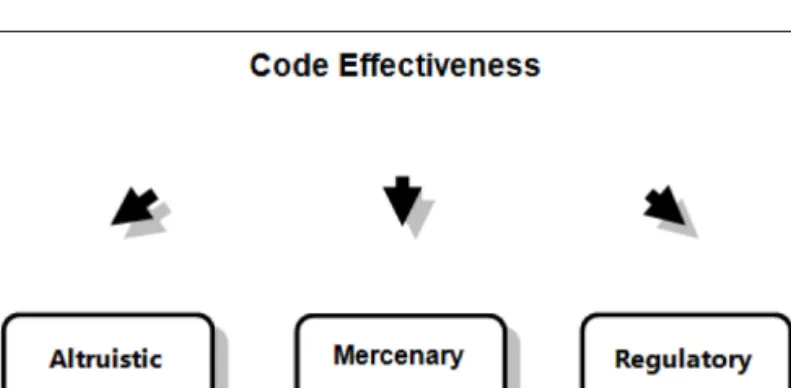
Perceived ethical leadership in relation to employees’ organisational commitment
The aim of this study is to establish the relationship between ethical leadership and organizational commitment. A cross-sectional quantitative survey approach was used, with a non-probability sample of 839 employees of a railway organization in the Democratic Republic of Congo. The results indicate that perceptions of ethical leadership have a significant impact on organizational commitment.
The study also indicates that ethical leadership predicted employees' affective, continuance, normative and overall commitment. These results add new insights to the construct of business ethics by showing that a positive perception of ethical leadership by employees is an important consideration to strengthen their organizational commitment. In fact, meta-analytic research shows that engaged individuals are less likely to leave the organization (Mathieu & Zajac, 1990; Meyer. & Maltin, 2010); are more likely to be present at work (Meyer, Stanley, Herscovitch & Topolnysky, 2002); perform effectively (Ismail & Daud, 2014); and are considered valuable assets to the organization (Coetzee, Schreuder & Tladinyane, 2013).
According to Richardson, Cook and Hofmeyr (2011), to achieve success in relation to employee engagement, organizations need ethical leaders – individuals with strong interpersonal and interpersonal skills and competencies such as fairness and respect – to inspire, motivate and encourage their employees. intention to stay.
Previous research has established that ethical leadership predicts employee outcomes such as job satisfaction, organizational commitment, and organizational citizenship behaviors (Yates, 2014). Research on the relationship between ethical leadership and organizational commitment is needed in the context of developing countries to clarify the universality of ethical leadership's influence on individuals' commitment levels. Concretely, the relationship between ethical management and employee commitment in the context of the workplace requires further investigation.
The purpose of this study was therefore to investigate the connection between ethical management and employees' commitment to the organization. The purpose of this study was to determine the relationship between ethical leadership and organizational commitment. The broader objective was to determine whether ethical leadership significantly influenced the level of employee engagement in the railway industry in the DRC.
The analysis showed that ethical leadership is related to affective, normative, continuance and overall organizational commitment. This will help researchers gain further insight into the effects of ethical leadership on employees. The effects of ethical leadership on manager job satisfaction, commitment, behavioral outcomes and firm performance.
Exploring the relationship between ethical leadership and job satisfaction, organizational commitment, and organizational citizenship behavior. Exploring the relationship between ethical leadership and job satisfaction, organizational commitment, and organizational citizenship behavior.
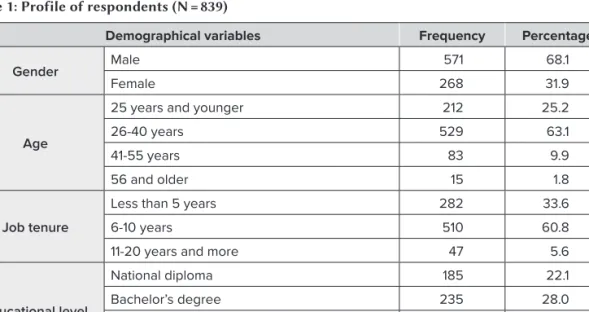
Work ethics of different
In the current study, work ethic was measured using the Multidimensional Work Ethic Profile (MWEP). In light of the above discussion, it is clear that generational cohorts differ in terms of the dimensions that work ethics encompass. The above findings show that there are similarities and differences between the generation cohorts in their evaluation of the measured facets of work ethics.
The findings regarding the work ethic of the different generational groups (see Tables 1 to 3) show some similarities and some differences between the generational groups. Second, the findings indicated that all three generational groups considered morality/ethics to be the most important aspect of work ethics. The findings of the current study regarding morality/ethics negate the findings of previous research; for example, Twenge asserted that most previous studies have found that Generation X and Generation Y have weaker work ethics.
The facets of work ethic identified as important to the three generational cohorts in the current sample differed from those identified by previous research studies in developed countries. Therefore, further research is recommended to determine the generational differences in terms of work ethic and other variables between European and African countries. It is further recommended that studies be conducted to examine the perception of work ethics among Africans.
The most significant finding of the study was that all three generational groups included in the study rated morality/ethics as the most important aspect of work ethics. Hard work as an aspect of work ethic was not considered important by either generation.

Mutuality: A root principle for marketing ethics
It is easy to see that what this principle requires of sellers is very similar to the requirements of the consumer sovereignty principle. From a consumer point of view, there is a lot to be said for these two principles. The principles of consumer sovereignty and preserving the terms of an acceptable exchange suffer even greater shortcomings when judged from the seller's point of view.
However, it is not self-evident that in a transaction between competent adults it is the responsibility of the seller to provide the buyer with all information that the latter may consider relevant. How can it be the seller's responsibility to ensure there is freedom of choice in such circumstances. The first requirement of this principle is therefore that the seller makes a reasonable effort to promote the interests of the buyer by providing him with something of value to him (Elegido en 98-100; Melé, 2009b:276-279) .
It will be useful at this stage to identify some of the specific requirements of the MoJ. In the first place, even if the basis of the objection were accepted, it would still be possible to answer that, as Markovits has observed, . A brief summary of the line of argument up to this point may be useful here.
A comparison of the reciprocity principle with other ethical principles relevant to the field of marketing ethics. Many of the most important ethical principles applicable to the field of marketing are discussed in an excellent paper by Laczniak and Murphy (2006a). I do not point out these difficulties to argue for a rejection of the ethical principles advocated by Laczniak and Murphy.
The reason is that it is a very short contribution, limited to dealing with sales situations, and I am interested in the whole arc of the seller-buyer relationship.
The stakeholder theory of corporate control and the place of ethics in OHADA
The case of Cameroon
As such, laws enacted to adopt common rules shall be referred to as "Uniform Laws" under Article 5 of the Convention8. Despite their legal disparity, Cameroon has a single constitution that serves as the country's primary law. The challenges faced by civil law judges in the francophone region are minimal and often trivial, perhaps due to familiarity with the civil law-inspired wording and application of OHADA texts.
In the first place, Article 42 (original) of the OHADA Treaty states that the working language of the Treaty shall be French. Although administered by two distinct legal systems, the Constitution, in the first paragraph of the preamble, recognizes Cameroon as "one and the same nation, bound by the same destiny". Only the President of the Republic, the National Assembly and the Senate can refer matters to the Constitutional Council (Tumnde.
Bollinger illustrates the impact of community law in the context of the host country, a scenario that also applies in the common law regions of Cameroon. Managing ethical behavior is one of the most pervasive and complex problems facing business organizations today (Stead, Worrell & Stead, 1990: 233). On the contrary, the spirit of the OHADA treaty testifies to the willful neglect of areas that could create problems for profit-seeking investors.
OHADA's architects' vision of seeking harmonization of business legislation and subsequent integration in the region has been realized to a remarkable extent. The text of the original OHADA Treaty is available at the OHADA Secretariat in Yaounde, Cameroon; the Common Court and Arbitration (CCJA) in Abidjan, Ivory Coast; and OHADA Training Center (ERSUMA), in Porto Novo, Benin.
Learn to lead responsibly
MPhil and PhD Programmes in Applied Ethics at Stellenbosch University in 2017
